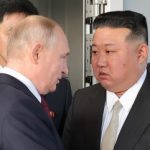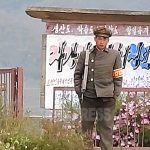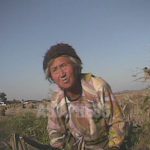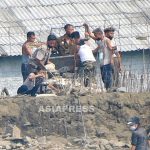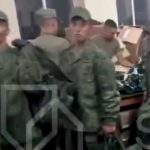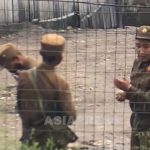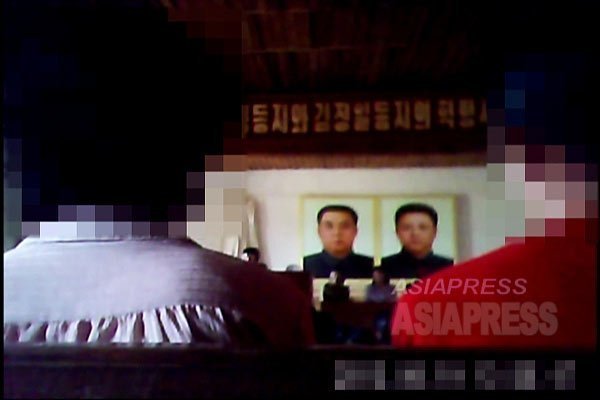
◆ 90% decrease in trade with China deals huge blow to domestic economy
Rapid and thorough coronavirus countermeasures have unfortunately had a massive impact on the economy. Due to the border blockade and restriction of domestic movement, the prices of Chinese goods have risen tremendously and markets have fallen into recession. In addition, many citizens in the border regions were employed in cargo shipping and depended upon the work for their source of cash income.
Chinese food, over-the-counter medicine, and clothing had all but disappeared from local markets by April. Various reporting partners said to ASIAPRESS, “The number of people eating 2 meals or fewer a day has really skyrocketed” and “people are saying that they will sooner die of starvation than from coronavirus infection.”
On April 23, Chinese customs authorities issued a report with trade figures from March. According to the report, North Korean exports to China amounted to only $610,000, down 96.2% from the same period the year before. Imports also fell by 90.8% to $18.03 million. The report detailed an overall 91.3% decrease to total exports and imports between the countries. Due to the UN Security Council’s economic sanctions imposed in 2017, North Korea’s trade volume in 2019 was almost half of what it was in 2016. In addition, in March 2020, imports from China included mainly quarantine-related aid, meaning that proper trade was almost halted entirely.
State-run smuggling operations at sea and along the Yalu River have been almost completely stopped as well. A Korean-Chinese acquaintance from Liaoning Province, who worked as an interpreter aboard a Chinese vessel for large-scale smuggling operations with North Korean fish and shellfish traders, lamented the fact that North Korean authorities had discontinued the covert transshipments.
According to a trade broker from Jilin Province, the Chinese customs authorities have signaled that trade could be resumed after late May, though Beijing is wary of the possibility of coronavirus being spread from North Korea. In the meantime, North Korean citizens will continue to face difficulties and the government, including the military, police, and Party agencies, will face reductions in their operating funds.
◆ Mobilizing laborers for the economy will hinder quarantine efforts
In terms of countermeasures against the coronavirus, North Korea’s dictatorial system made quarantine measures easier to enforce. Indeed, the movement of North Korean citizens was already highly controlled and people had few means of high-speed travel. The North Korean system also had several drawbacks though.
One drawback is North Korea’s military barracks, where a million soldiers live together in tight quarters. In fact, the wing of the military which specializes in national construction projects has its recruits live together in tents throughout the year. There are more than 100,000 soldiers detached to units such as this.
Mobilization of the public for daily political events also poses a risk by increasing the risk of possible transmission. All North Koreans belong to political organizations and have daily activities relating to these organizations. There is the Youth Alliance for those under 40, general unions for laborers, the Workers’ Party for party members, and the Women’s alliance for housewives. These organizations hold compulsory self-criticism sessions for members every Saturday. Citizens are also frequently mobilized for political ideology study sessions, anti-American rallies, and commemorations for the anniversaries of Kim Il-sung and Kim Jong-il’s births.
Each year, from early April to early summer, the public is mobilized to assist farmers with sowing and planting. With residents transported from the cities out to the rural areas of the country, this period brings the largest movement of people each year. Naturally, the mobilization will bring an increased risk of coronavirus infections. Reporting partners from various parts of the country have confirmed that the mobilization process “began around April 25.” As North Korea’s economy depends upon the mobilization of its people, keeping coronavirus at bay will prove to be very difficult.
In order to prevent coronavirus infections in the North Korean People’s Army, the Kim Jong-un regime has completely isolated its troops and banned soldiers from going off-base, where they may come into contact with civilians. According to various reporting partners, as of mid-May, the only soldiers to be seen out on the streets are the officers in charge of enforcing the isolation orders. In addition, the health of soldiers on bases is said to be rapidly deteriorating, as they are blocked from their usual sources of supplementary food.
Though North Korea will be in a rush to recover economically and resume trade and travel across the Chinese border, domestic countermeasures against coronavirus must be well-maintained. The mobilization of the population and the organizational activities required to uphold the North Korean system, however, will pose a great threat to domestic quarantine efforts. This will be a huge cause for concern and likely pose the greatest challenge that the Kim Jong-un regime has faced thus far in its 8 years of rule.
Residents are frequently mobilized for political rallies and ideology study sessions by their workplaces and political organizations. These activities pose a great risk of transmission and may result in coronavirus hotbeds. This photo, taken by ASIAPRESS in June 2013, shows women of Ryanggang Province gathered for a political ideology study session.
- <Inside N. Korea> Rotten Luck: Residents Falling Sick From Eating Spoiled, Low-Quality Food as Border Blockade Increases Dependency on Domestic Industries (2020-05-22 17:54:19)
- <Inside N. Korea> Cleaning Out: Markets Temporarily Close for Massive Disinfection Campaign (2020-05-22 10:13:33)
- <Inside N. Korea> COVID-19 Countermeasures Ban Soldiers from Leaving Bases, Leading to Widespread Malnourishment (2020-05-18 14:14:00)
- <Inside N. Korea> Rising Prices, Rising Tensions: Merchants Confront Police in Protest over Regime’s Market Regulations (2020-05-11 18:22:33)
- <N. Korea Pro Report (Part 4)> How is N. Korea’s Economy Faring in the Face of the Coronavirus Pandemic and Continued Sanctions? A Look at the Exploitation of Women Working Overseas (2020-05-08 18:42:47)
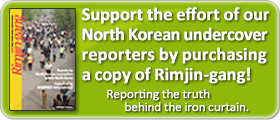 Editor’s notes on North Korean reporters
Editor’s notes on North Korean reporters
ALL REPORTS >>>
ARCHIVE(pdf) >>
DPRK MAP >>
